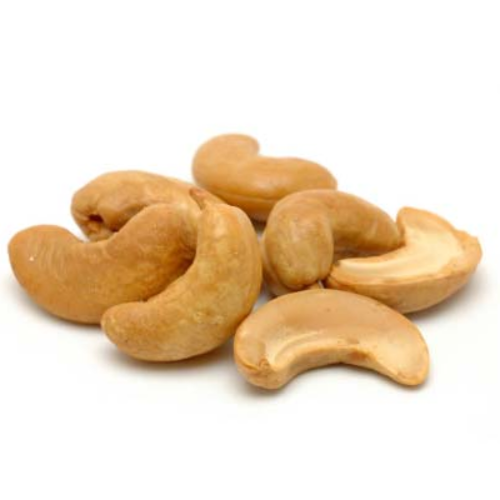Краткие сведения
Подробное описание товара
WHAT is it..?
Cashew nuts are actually seeds that adhere to the bottom of the cashew apple, the fruit of the cashew tree. The seed we know as the kidney-shaped cashew "nut" is delicate in flavor and firm, but slightly spongy, in texture.
You have probably noticed that cashews in the shell are not available in stores. This is because these nuts are always sold pre-shelled since the interior of their shells contains a caustic resin, known as cashew balm, which must be carefully removed before they are fit for consumption. This caustic resin is actually used in industry to make varnishes and insecticides.
Cashews, known scientifically as Anacardium occidentale, belong to the same family as the mango and pistachio nut.
Health Benefits
Heart-Protective Monounsaturated Fats
Not only do cashews have a lower fat content than most other nuts, approximately 82% of their fat is unsaturated fatty acids, plus about 66% of this unsaturated fatty acid content are heart-healthy monounsaturated fats, similar to those found in olive oil. Studies of diabetic patients show that monounsaturated fat, when added to a low-fat diet, can help to reduce high triglyceride levels. Triglycerides are a form in which fats are carried in the blood, and high triglyceride levels are associated with an increased risk for heart disease, so ensuring you have some monounsaturated fats in your diet by enjoying cashews is a good idea, especially for persons with diabetes.
Crazy about Your Heart? Go Nuts
Research published in the British Journal of Nutrition (Blomhoff R, Carlsen MH), which identified several nuts among plant foods with the highest total antioxidant content, suggests nut's high antioxidant content may be key to their cardio-protective benefits.
Nuts' high antioxidant content helps explain results seen in the Iowa Women's Health Study in which risk of death from cardiovascular and coronary heart diseases showed strong and consistent reductions with increasing nut/peanut butter consumption. Total death rates decreased 11% and 19% for nut/peanut butter intake once per week and 1-4 times per week, respectively.
Copper for Antioxidant Defenses, Energy Production, Bones and Blood Vessels
An essential component of many enzymes, copper plays a role in a wide range of physiological processes including iron utilization, elimination of free radicals, development of bone and connective tissue, and the production of the skin and hair pigment called melanin. For example, copper is an essential component of the enzyme, superoxide dismutase, which is important in energy production and antioxidant defenses. Copper is also necessary for the activity of lysyl oxidase, an enzyme involved in cross-linking collagen and elastin, both of which provide the ground substance and flexibility in blood vessels, bones and joints. Low dietary intake of copper may also be associated with increased fecal free radical production and fecal water alkaline phosphatase activity, risk factors for colon cancer.
Bone Up and Relax with Cashews
Everyone knows that calcium is necessary for strong bones, but magnesium is also vital for healthy bones. About two-thirds of the magnesium in the human body is found in our bones. Some helps give bones their physical structure, while the rest is found on the surface of the bone where it is stored for the body to draw upon as needed.
Magnesium, by balancing calcium, helps regulate nerve and muscle tone. In many nerve cells, magnesium serves as Nature's own calcium channel blocker, preventing calcium from rushing into the nerve cell and activating the nerve. By blocking calcium's entry, magnesium keeps our nerves (and the blood vessels and muscles they ennervate) relaxed. If our diet provides us with too little magnesium, however, calcium can gain free entry, and the nerve cell can become overactivated, sending too many messages and causing excessive contraction.
Help Prevent Gallstones
Twenty years of dietary data collected on 80,000 women from the Nurses' Health Study shows that women who eat least 1 ounce of nuts, peanuts or peanut butter each week have a 25% lower risk of developing gallstones. Since 1 ounce is only 28.6 nuts or about 2 tablespoons of nut butter, preventing gallbladder disease may be as easy as packing one cashew butter and jelly sandwich (be sure to use whole wheat bread for its fiber, vitamins and minerals) for lunch each week, having a handful of cashews as an afternoon pick me up, or tossing some cashews on your oatmeal or salad.
Eating Nuts Lowers Risk of Weight Gain
Although nuts are known to provide a variety of cardio-protective benefits, many avoid them for fear of weight gain. A prospective study published in the journal Obesity shows such fears are groundless. In fact, people who eat nuts at least twice a week are much less likely to gain weight than those who almost never eat nuts.
A Few Quick Serving Ideas
- Combining cashews with other nuts and dried fruits makes a healthy snack.
- Right before taking off the heat, add cashews to healthy sautéed vegetables.
Healthy sauté cashews with shrimp, basil and green beans for a delightful Thai inspired dish.
- Cashews with a little bit of maple syrup make a great topping for hot cereals.
- Add cashew butter to breakfast soy or rice milk shakes to up their protein content (a quarter-cup of cashews provides over 5 grams of protein) and give them a creamy nutty taste.
- In a saucepan over low-medium heat, mix cashew butter with some soy sauce, cayenne pepper, garlic, ginger and water to make a wonderful sauce for fish, vegetables, tofu or rice.
- To roast cashews at home, do so gently&mdashin a 160-170°F (about 75°C) oven for 15-20 minutes&mdashto preserve the healthy oils.
нет данных о компании
Пожалуйста авторизируйтесь чтобы написать отзыв
Отзывы клиентов
- Отзывов пока нет






